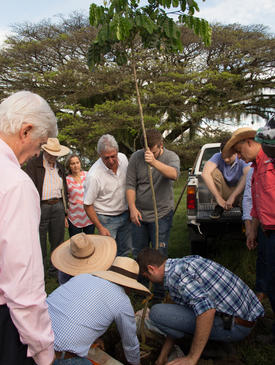Silvopastoral Heirs: Sustainable Cattle Ranching and Ecological Restoration in Pilot Farms
Summary
Transforming conventional cattle ranching into sustainable forms of livestock production is an essential step in preserving the natural ecosystems of Latin America. Ecological restoration creates new opportunities to sustain rural livelihoods in the region. However, the continuity of both efforts depends on generational exchange. Transmitting knowledge and values is fundamental for guaranteeing sustainable land use in the future. In this sense, participatory research is a powerful tool to motivate new generations to assume their role as custodians of the land.
This course is aimed at the sons and daughters of some of the leading sustainable cattle farmers in Colombia. This new generation of Silvopastoral Heirs must continue the task of integrating sustainable livestock production with conservation and ecological restoration. The course will be held at El Hatico Nature Reserve, an estate that has been managed by nine generations of a single family and is an international reference for sustainable production. We will present some theoretical and practical aspects of restoration integrated to sustainable livestock production, and explore the role of folk music in rural sustainability. The course will also contribute to consolidate a network for the exchange and communication of hope among these young producers.
Content
Day 1
Morning
- Presentation of participants and pilot farms. Julián Giraldo, Adriana Giraldo (ELTI alumni) and Adolfo Cardozo.
- Generational exchange at El Hatico Reserve. Molina-Durán family
- Ecological restoration: science of hope. Zoraida Calle
- Heirs of Bellavista, participatory research and ecological restoration: community work focused on water. Julián and Adriana Giraldo (ELTI alumni).
Afternoon
- Guided tour of silvopastoral systems and biological corridor.
- How to integrate silvopastoral systems to ecological restoration? Alicia Calle.
- Folklore from the Llanos: it’s role in supporting a culture of sustainable cattle ranching. Adolfo Cardozo.
- Group exercise 1: Silvopastoral heirs: custodians of the land, farms, culture and families.
Day 2
- Field trip: Sugar Cane Museum and Nirvana Nature Reserve (Palmira, Valle del Cauca).
Day 3
Morning
- People, livestock and trees: A history of passion and cultural roots. Enrique Murgueitio.
- Colombian Sustainable Cattle Ranching Project: ecological restoration and pilot farms. Julián Giraldo and Enrique Murgueitio R.
- Group exercise 2. My pilot farm: silvopastoral systems and ecological restoration.
- Group exercise 3. Weaving a network of Silvopastoral Heirs
Afternoon
- Plenary of group presentations
- Commitments to the Colombian network of silvopastoral heirs.
- Music of the land. León Octavio Osorno, Grupo Campo y Sabor. Adolfo Cardozo from Venezuela.
- Closing dinner


